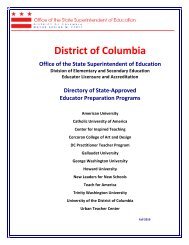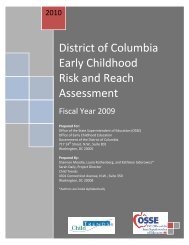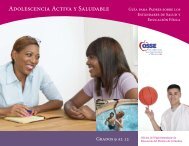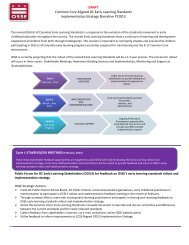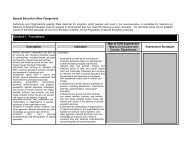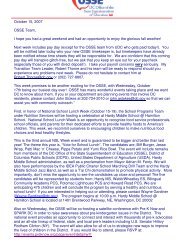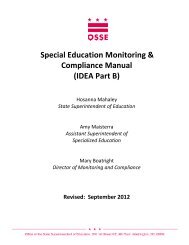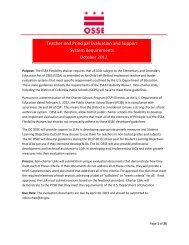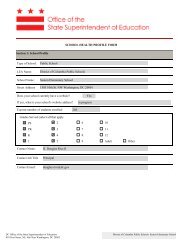DC Special Education Memorandum [PDF] - osse
DC Special Education Memorandum [PDF] - osse
DC Special Education Memorandum [PDF] - osse
You also want an ePaper? Increase the reach of your titles
YUMPU automatically turns print PDFs into web optimized ePapers that Google loves.
From: Beekman, Lyn (OSSE-Contractor)<br />
Sent: Wednesday, April 28, 2010 11:01 AM<br />
To: Anna Forbes Towns; Anthony Davenport; Berner, Kendra E. (<strong>DC</strong>PS); Bhuller, Harsharen<br />
(<strong>DC</strong>PS); Bogin Matthew (matthew.bogin@boginlaw.com); Brian Gruber; Camille Henley; Carolyn<br />
Houck; Cathy Braxton; Charles Canty; Chesseley Robinson; Chike Ijeabuonwu; Chor, Tanya<br />
(<strong>DC</strong>PS); Christopher Anwah; Christopher West; Domiento Hill; donnawulkan@hotmail.com;<br />
Donovan Anderson; Douglas Tyrka; Elizabeth Jester; Ellen D. Dalton, Esq.; Famata Barrie; Fripp,<br />
Nia (<strong>DC</strong>PS-OGC); George, Laura A. (<strong>DC</strong>PS-OGC); Georgina Oladokun; Harris-Lindsey, Quinne<br />
(<strong>DC</strong>PS-OGC); Harry Goldwater; Hillary Webber; Iris Barnett; Jerrold Miller; Jessica Smith; John<br />
Straus; Joy Freeman-Coulbary; Karen Alvarez; Kim, Daniel (<strong>DC</strong>PS-OGC); Larry Huebner; Laura<br />
Rinaldi; Margaret Kohn; Maria Blaeuer; Marshall Taylor; McCall, Daniel (<strong>DC</strong>PS-OGC); Megan<br />
Gorzynski; Michael Eig; Michelle Henry; Miguel Hull; Nakisha Winston; Nicole Mackin; Olekanma<br />
Ekekwe; Pamela Roth; Paul Dalton; Pierre Bergeron; Roberta Gambale; Roy Howell; Sabrina<br />
Bazemore; Sandifer, Candace (<strong>DC</strong>PS); Smalls, Linda (<strong>DC</strong>PS-OGC); Stephen Watsky; Steven<br />
Boretos; Tiffany Winters; Timothy Brown; Tracy Riller Givens; Will Purcell; William Houston;<br />
Williams, Ann J. (<strong>DC</strong>PS-OGC); Yael Zakai; Zachary Nahass<br />
Cc: Lewis Bossing; Deena Fox; Lipscomb, Angela; Sandman, James (<strong>DC</strong>PS-OGC); Harris-Lindsey,<br />
Quinne (<strong>DC</strong>PS-OGC); Colleye, Beth (OSSE); Edmunds, Carmela (OSSE)<br />
Subject: Meetings with CHO re: new standard practices<br />
Importance: High<br />
Re:<br />
NOTICE OF MEETINGS—May 11 & 12, 2010 Re: New Standard Practices<br />
Hello Members of the <strong>Special</strong> <strong>Education</strong> Bar,<br />
From the time I assumed the position of Chief Hearing Officer in June 2009, I have had<br />
the opportunity to speak with many of you in groups or individually. During these<br />
discussions, among other things, I requested advice as to the problems and concerns you<br />
had with our Due Process Hearing system, invited you to share your suggestions to<br />
improve it, and offered some ideas I had for your reaction. The comment I heard most<br />
frequently by far was the need for a more consistent approach among all the Hearing<br />
Officers with regard to their handling the entire process, from the prehearing through the<br />
decision.<br />
Months ago I met with the Hearing Officers (HO’s) and discussed with them at some<br />
length this major concern regarding greater consistency. Although some had their<br />
preferences with regard to how certain tasks should be handled, they agreed the concern<br />
should be addressed believing that it would improve the efficiency and effectiveness of<br />
the hearing process for all of the participants, hopefully providing a better result for<br />
children with disabilities. Over the last several months, in cooperation with the HO’s, I<br />
have developed a set of appropriate standard practices, including forms. A copy of them<br />
and a “List of Practice Implementation Topics” from my recent HO training are attached.<br />
I want to stress that these practices are guidance, not an OSSE reg or policy and do not<br />
have the force of law. Rather, they reflect what I believe are “appropriate standard legal<br />
practices” required for due process hearings conducted under IDEA in areas not<br />
addressed under IDEA, <strong>DC</strong> regs or the Consent Decree/SOP. In these unaddressed areas I
elieve the law clearly provides that hearing officers have the discretion and<br />
responsibility to conduct and manage the process so as to accord the parties a meaningful<br />
opportunity to exercise their rights and ensure the hearing serves as an effective<br />
mechanism for resolving disputes. See in this regard Letter to Anonymous, 23 IDELR<br />
1073 (OSEP 1995) and its progeny. Accordingly, Hearing Officers will substantially<br />
implement these practices in all hearings and members of the Bar appearing before them<br />
will be expected to comply with them (including the forms) with this caveat. If in a<br />
particular situation a good reason exists to deviate from the standard practice, at the<br />
suggestion of either counsel or the HO, the HO would have the discretion to do so noting<br />
the reason.<br />
If some of these practices appear to be ones that were previously in effect, you’re right.<br />
Many are but I wanted to reaffirm them to gain consistency. Most importantly, many of<br />
these practices I believe will provide greater assurance that the requirements of the<br />
Consent Decree/SOP will be met. While given their nature many of these practices have<br />
already been implemented, generally HO’s will be expecting compliance as of Monday,<br />
May 24, 2010. In order to explain the practices, and respond to any questions you might<br />
have concerning them, three meetings have been scheduled. The same information will<br />
be presented at all meetings, but I scheduled three meetings given the likelihood some<br />
would have conflicts if we held but one. The meetings will be held on Tuesday, May 11<br />
at both 4:00 p.m. and 6:30 p.m., and Wednesday, May 12, 2010, at 6:30 p.m., in the Van<br />
Ness Elementary School, 1150 Fifth Street, S.E., where the SHO Office is located,<br />
specifically in the Auditorium. We anticipate the meetings might last about an hour to an<br />
hour and a half. For any of you who are unable to attend either meeting but would like to<br />
discuss, or have a question about any of the practices, please do not hesitate to stop by<br />
and see me when you are at the SHO office, drop me a line, or give me a call at (o) 202-<br />
481-3448 or (c) 517-290-2555.<br />
Without doubt, implementing these practices will require most of us to change our ways<br />
with regard to how we did some things in the past. Further, making changes for most of<br />
us is not easy and some might understandably disagree with some of the changes being<br />
made. But, to improve the Due Process Hearing system as a whole, as well as our<br />
performance in carrying out our respective roles in it, change is imperative. As we<br />
implement these practices moving forward, the Hearing Officers and I will be monitoring<br />
their effectiveness with an eye toward making possible adjustments in some down the<br />
road. I would appreciate your assistance in this regard, for while I believe these practices<br />
are sound and appropriate, I recognize the likelihood some adjustments may be needed.<br />
The ultimate goal of the hearing process under IDEA is to assure the right of a child with<br />
disabilities to an appropriate education is upheld. Hopefully, the implementation of these<br />
practices will help both Hearing Officers and the Bar to better achieve that goal, and<br />
provide us all with greater professional satisfaction.<br />
Another item I would like to discuss with you at the meetings is a recent revision in how<br />
Hearing Officers will be evaluated. Previously, parties and their representatives could fill
out a survey form (available on the SHO website and in the hall outside the SHO office)<br />
regarding the Hearing Officer’s performance on each case. While this form will continue<br />
to be available, in August of each year you will be provided the opportunity to<br />
anonymously fill out a survey to reflect your views as to that Hearing Officer’s overall<br />
performance.<br />
Finally, some of you have asked how cases are assigned to HO’s by the SHO. Attached<br />
is the SHO’s Assignment Procedure.<br />
I look forward to hopefully seeing you at one of the meetings.<br />
Lyn Beekman, Chief Hearing Officer


![DC Special Education Memorandum [PDF] - osse](https://img.yumpu.com/26875015/1/500x640/dc-special-education-memorandum-pdf-osse.jpg)
